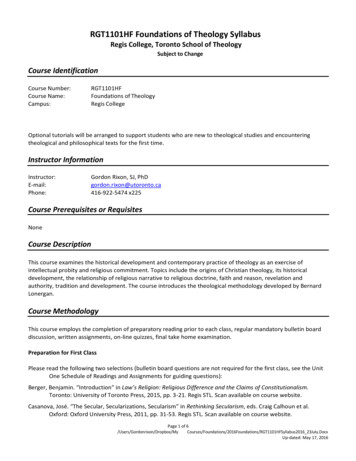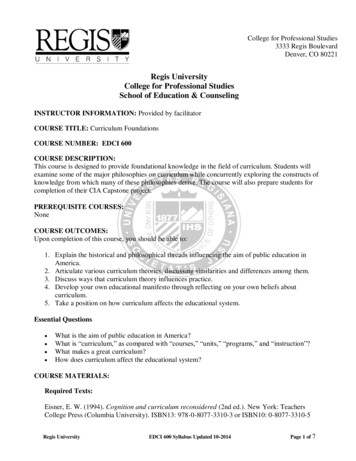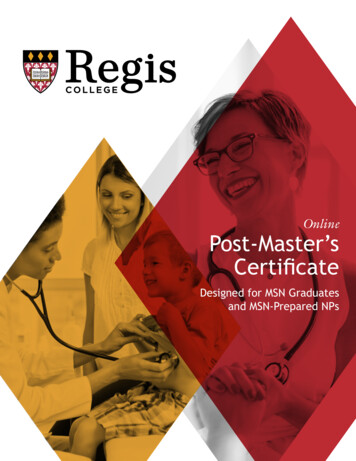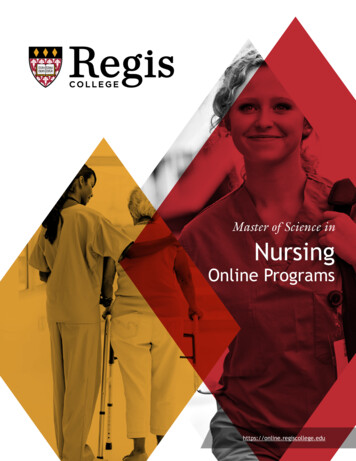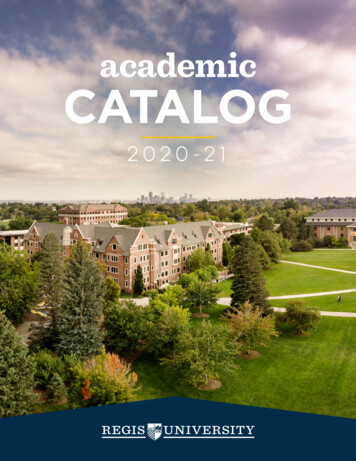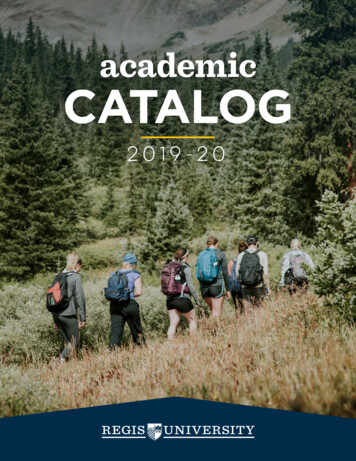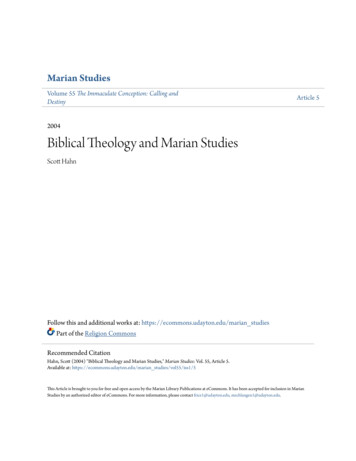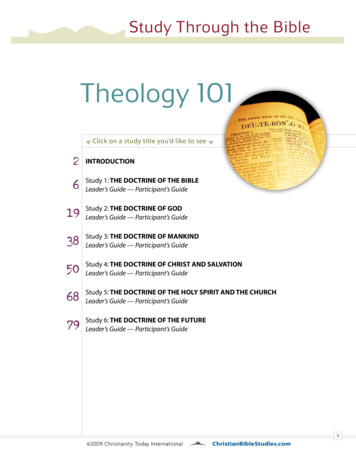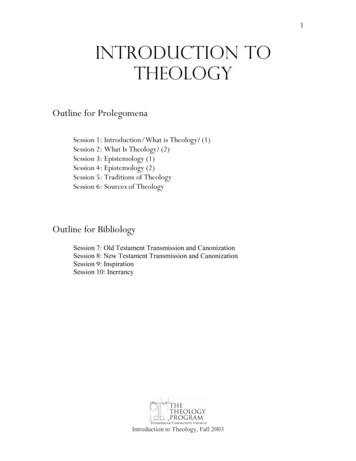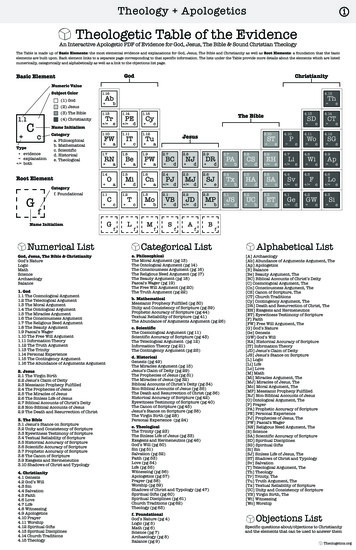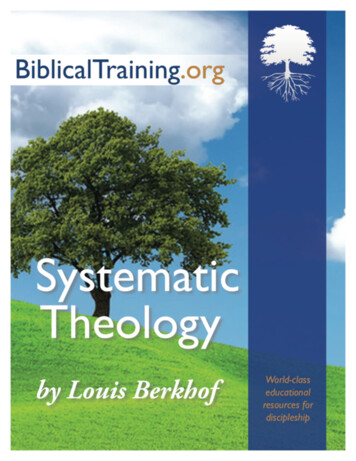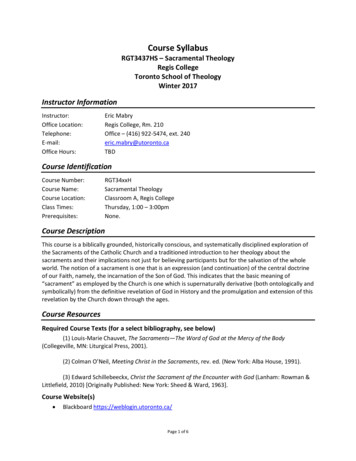
Transcription
Course SyllabusRGT3437HS – Sacramental TheologyRegis CollegeToronto School of TheologyWinter 2017Instructor InformationInstructor:Office Location:Telephone:E-mail:Office Hours:Eric MabryRegis College, Rm. 210Office – (416) 922-5474, ext. 240eric.mabry@utoronto.caTBDCourse IdentificationCourse Number:Course Name:Course Location:Class Times:Prerequisites:RGT34xxHSacramental TheologyClassroom A, Regis CollegeThursday, 1:00 – 3:00pmNone.Course DescriptionThis course is a biblically grounded, historically conscious, and systematically disciplined exploration ofthe Sacraments of the Catholic Church and a traditioned introduction to her theology about thesacraments and their implications not just for believing participants but for the salvation of the wholeworld. The notion of a sacrament is one that is an expression (and continuation) of the central doctrineof our Faith, namely, the incarnation of the Son of God. This indicates that the basic meaning of“sacrament” as employed by the Church is one which is supernaturally derivative (both ontologically andsymbolically) from the definitive revelation of God in History and the promulgation and extension of thisrevelation by the Church down through the ages.Course ResourcesRequired Course Texts (for a select bibliography, see below)(1) Louis-Marie Chauvet, The Sacraments—The Word of God at the Mercy of the Body(Collegeville, MN: Liturgical Press, 2001).(2) Colman O’Neil, Meeting Christ in the Sacraments, rev. ed. (New York: Alba House, 1991).(3) Edward Schillebeeckx, Christ the Sacrament of the Encounter with God (Lanham: Rowman &Littlefield, 2010) [Originally Published: New York: Sheed & Ward, 1963].Course Website(s) Blackboard https://weblogin.utoronto.ca/Page 1 of 6
This course uses Blackboard for its course website. To access it, go to the UofT portal login page athttp://portal.utoronto.ca and login using your UTORid and password. Once you have logged in to theportal using your UTORid and password, look for the My Courses module, where you’ll find the link tothe website for all your Blackboard-based courses. (Your course registration with ROSI gives you accessto the course website at Blackboard.) Note also the information ation-students. Students who have trouble accessingBlackboard should contact the instructor immediately and seek help from the University’s ITdepartment.Course Learning ObjectivesRegis CollegeBD LevelStudents successfully completing this course will be able to demonstrate the following learningoutcomes.(A) IN RESPECT OF GENERAL ACADEMIC SKILLS, students will develop an aptitude for (1)interpreting, (2) analyzing, and (3) appraising primary texts within the Christian theologicaltradition through a close (and sometimes guided) reading of texts and written assignmentswherein students describe, compare, and evaluate the texts they have read.(B) IN RESPECT OF THE UNDERSTANDING OF THE CONTENT OF ONE OR MORE THEOLOGICALDISCIPLINES, students will learn to:(1) Distinguish and relate sign, symbol, and sacrament.(2) Identify and Evaluate the Analogical Character of the term “sacrament.”(3) Examine and illustrate the symbolic and causal character of the sacraments.(4) Demonstrate the relevance of other mysteries of the Faith (such as the Trinity andIncarnation) for sacramental theology.(C) IN RESPECT OF PERSONAL AND SPIRITUAL FORMATION, students will enrich their appraisal ofthe symbolic meaning and causal efficacy of the Sacraments by situating them in developingcultural and historical contexts. This written exercise will equip students to appropriate theirown active participation in the liturgical celebration of the Sacraments.(D) IN RESPECT OF MINISTERIAL AND PUBLIC LEADERSHIP, because students are able to describeand appraise the symbolic character of human existence and identify the various ways in whichhumans make meaning and are affected by meaning, they will be able to illustrate thesignificance of diverse liturgical settings and the correct implementation of the rites of theChurch in the celebration of the Sacraments.AD Level: N/APage 2 of 6
EvaluationRequirementsThe final grade for the course will be based on evaluations in three areas.(1) Preparation, participation, and reading (10%) – In addition to participating in the regular activity ofthe class, including the reading of the required texts, students are expected to engage the materialactively during lecture and seminar through questions and conversation.(2) Weekly Précis and Questions (15%)—Each week, students will be required to submit a one page(300-500 word) précis of one of the assigned readings, followed by two, textually focused, questionseither for understanding or for judgment.(3) Short papers (25% x 3) – Students are expected to submit three short papers during the course of theterm. These papers will be due during weeks 5, 9, and on the final examination day.Grading SystemA (90-100)A (85-89)A- (80-84)B (77-79)B (73-76)B- (70-72)FailurePlease see the appropriate handbook for more details about the grading scale and non-numerical grades(e.g. SDF, INC, etc).Late work (BD). Basic Degree students are expected to hand in assignments by the date given in thecourse outline. [The instructor should stipulate the penalty for late work.] This penalty is not applied tostudents with medical or compassionate difficulties; students facing such difficulties are kindlyrequested to consult with their faculty adviser or basic degree director, who should make arecommendation on the matter to the instructor. The absolute deadline for the course is theexamination day scheduled for the course. Students who for exceptional reasons (e.g., a death in thefamily or a serious illness) are unable to complete work by this date may request an extension (SDF “standing deferred”) beyond the term. An SDF must be requested from the registrar’s office in thestudent’s college of registration no later than the last day of classes in which the course is taken. TheSDF, when approved, will have a mutually agreed upon deadline that does not extend beyond theconclusion of the following term. If a student has not completed work but has not been granted an SDF,a final mark will be submitted calculating a zero for work not submitted.Late work (AD). N/A.Course grades. Consistently with the policy of the University of Toronto, course grades submitted by aninstructor are reviewed by a committee of the instructor’s college before being posted. Course gradesmay be adjusted where they do not comply with University grading icies/grading.htm) or college grading policy.Page 3 of 6
PoliciesAccessibility. Students with a disability or health consideration are entitled to accommodation.Students must register at the University of Toronto’s Accessibility Services offices; information isavailable at http://www.accessibility.utoronto.ca/. The sooner a student seeks accommodation, thequicker we can assist.Plagiarism. Students submitting written material in courses are expected to provide full documentationfor sources of both words and ideas in footnotes or endnotes. Direct quotations should be placed withinquotation marks. (If small changes are made in the quotation, they should be indicated by appropriatepunctuation such as brackets and ellipses, but the quotation still counts as a direct quotation.) Failure todocument borrowed material constitutes plagiarism, which is a serious breach of academic,professional, and Christian ethics. An instructor who discovers evidence of student plagiarism is notpermitted to deal with the situation individually but is required to report it to his or her head of collegeor delegate according to the TST Basic Degree Handbook (linked fromhttp://www.tst.edu/content/handbooks) and the University of Toronto Code of Behaviour on AcademicMatters ry.aspx?did 4871. A student whoplagiarizes in this course. Students will be assumed to have read the document “Avoidance of plagiarismin theological writing” published by the Graham Library of Trinity and Wycliffe Colleges(http://www.trinity.utoronto.ca/Library Archives/Theological Resources/Tools/Guides/plag.htm.Other academic offences. TST students come under the jurisdiction of the University of Toronto Codeof Behaviour on Academic Matters ehaveac.htm).Back-up copies. Please make back-up copies of essays before handing them in.Obligation to check email. At times, the course instructor may decide to send out important courseinformation by email. To that end, all students are required to have a valid utoronto email address.Students must have set up a utoronto email address which is entered in the ROSI system. Information isavailable at www.utorid.utoronto.ca. The course instructor will not be able to help you with this. 416978-HELP and the Help Desk at the Information Commons can answer questions you may have aboutyour UTORid and password. Students should check utoronto email regularly for messages about thecourse. Forwarding your utoronto.ca email to a Hotmail, Gmail, Yahoo or other type of email account isnot advisable. In some cases, messages from utoronto.ca addresses sent to Hotmail, Gmail or Yahooaccounts are filtered as junk mail, which means that emails from your course instructor may end up inyour spam or junk mail folder.Email communication with the course instructor. The instructor aims to respond to emailcommunications from students in a timely manner. All email communications from students should besent from a utoronto email address. Email communications from other email addresses are not secure,and also the instructor cannot readily identify them as being legitimate emails from students. Theinstructor is not obliged to respond to email from non-utoronto addresses.Course ScheduleWeek 1Day, DateCourse introduction / What is a Divine Mystery?Page 4 of 6
Week 2Day, DateWhat is a Sacrament?Reading: TBDWeek 3Day, DateChrist as Sacrament.Reading: TBDWeek 4Day, DateChurch as SacramentReading: TBDWeek 5Day, DateIntroduction to the Sacraments of the ChurchReading: TBDWeek 6Day, DateBaptism and ConfirmationReading: TBDWeek 7Day, DateEucharist IReading: TBDWeek 8Day, DateEucharist IIReading: TBDWeek 9Day, DateReconciliationReading: TBDWeek 10Day, DateAnointing of the SickReading: TBDWeek 11Day, DateHoly OrdersReading: TBDWeek 12Day, DateMatrimonyReading: TBDExam WeekTBDPage 5 of 6
Select BibliographyAugustine. Teaching Christianity. Translated by Edmund Hill. Hyde Park, NY: New City Press,1996. The City of God. 2 Vols. Translated by William Babcock. Hyde Park, NY: New CityPress, 2012-13.Chauvet, Louis-Marie. Symbol and Sacrament: A Sacramental Reinterpretation of ChristianExistence. Translated by Patrick Madigan and Madeleine Beaumont. Collegeville, MN: LiturgicalPress, 1995.Guardini, Romano. The Spirit of the Liturgy. Translated by Ada Lane. New York: Herder andHerder, 1998.Hugh of St. Victor. On the Sacraments of the Christian Faith. Translated by Roy J. Deferrari.Cambridge, MA: The Mediaeval Academy of America, 1951.Lonergan, Bernard. “On the Notion of Sacrifice.” In Early Latin Theology. Vol. 19 of theCollected Works of Bernard Lonergan. Translated by Michael G. Shields. Edited by Robert M.Doran and H. Daniel Monsour. Toronto: University of Toronto Press, 2011.De Lubac, Henri. Corpus Mysticum: The Eucharist and the Church in the Middle Ages.Translated by Gemma Simmonds with Richard Price and Christopher Stephens. NotreDame, IN: University of Notre Dame Press, 2007.Martos, Joseph. Doors to the Sacred: A Historical Introduction to Sacraments in the CatholicChurch. Liguori, MO: Liguori Publications, 2014.McAuliffe, Clarence. Sacramental Theology: A Textbook for Advanced Students. St. Louis, MO:Herder, 1958.Peter Lombard. The Sentences. 4 Vols. Translated by Giulio Silano. Toronto: Pontifical Instituteof Medieval Studies, 2007-2010.Rahner, Karl. “The Church and the Sacraments,” in Inquiries. New York: Herder and Herder,1964: 191-294. “The Theology of the Symbol.” In Vol. 4 of Theological Investigations. Translated byKevin Smyth. Baltimore: Helicon Press, 1966: 221-252.Ratzinger, Joseph. The Spirit of the Liturgy. Translated by John Saward. San Francisco: IgnatiusPress, 2000.Thomas Aquinas. Summa Theologica. Translated by the Fathers of the English DominicanProvince. Notre Dame, IN: Christian Classics, 1981.Page 6 of 6
Course Syllabus RGT3437HS – Sacramental Theology Regis College Toronto School of Theology Winter 2017 Instructor Information Instructor: Eric Mabry Office Location: Regis College, Rm. 210 Telephone: Office – (416) 922-5474, ext. 240 E-mail: eric.mabry@utoronto.ca Office
